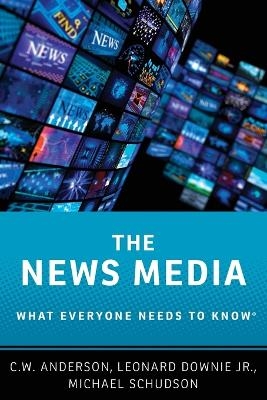
The News Media
Oxford University Press Inc (Verlag)
978-0-19-020620-8 (ISBN)
The business of journalism has an extensive, storied, and often romanticized history. Newspaper reporting has long shaped the way that we see the world, played key roles in exposing scandals, and has even been alleged to influence international policy. The past several years have seen the newspaper industry in a state of crisis, with Twitter and Facebook ushering in the rise of citizen journalism and a deprofessionalization of the industry, plummeting readership and revenue, and municipal and regional papers shuttering or being absorbed into corporate behemoths. Now billionaires, most with no journalism experience but lots of power and strong views, are stepping in to purchase newspapers, both large and small.
This addition to the What Everyone Needs to Know® series looks at the past, present and future of journalism, considering how the development of the industry has shaped the present and how we can expect the future to roll out. It addresses a wide range of questions, from whether objectivity was only a conceit of late twentieth century reporting, largely behind us now; how digital technology has disrupted journalism; whether newspapers are already dead to the role of non-profit journalism; the meaning of "transparency" in reporting; the way that private interests and governments have created their own advocacy journalism; whether social media is changing journalism; the new social rules of old media outlets; how franchised media is addressing the problem of disappearing local papers; and the rise of citizen journalism and hacker journalism. It will even look at the ways in which new technologies potentially threaten to replace journalists.
C. W. Anderson is an Associate Professor at the College of Staten Island (CUNY). Leonard Downie Jr. is Professor of Journalism at Arizona State University's Walter Cronkite School of Journalism. He is the former executive editor of The Washington Post from 1991 to 2008, during which time the newspaper won 25 Pulitzer Prizes. In his 44 years at the newspaper, he also was an investigative reporter, London correspondent, and editor at several levels. As deputy metro editor from 1972 to 1974, he helped supervise the newspaper's Watergate investigation. He is the author of five previous books, including a novel. Michael Schudson is Professor of Journalism at Columbia University. A sociologist and historian, he is the author of 8 books and co-editor of 3 books. His work has appeared in academic journals in media and communication studies, sociology, history, and political science, as well as in general audience publications.
Introduction
PART I: THE PAST
When and where was the world's first newspaper published?
And the first American newspaper?
And there was no such thing as journalism until the 1600s?
What were early newspapers like? Who started them and why?
And early newspapers in the American colonies?
What does the First Amendment mean?
How is the U.S. tradition of the free press different from traditions in other democracies?
How could the American founding fathers have approved the First Amendment and also supported federal subsidies for newspapers and also passed the Sedition Act of 1798 that made criticizing the federal government a crime?
Why were European visitors to the United States in the 19th century so often astonished - and sometimes appalled - by the American press?
How did newspapers become mass market media?
Did Karl Marx write regularly for Horace Greeley's New York Tribune?
Why did Abraham Lincoln spend so many hours in the telegraph office during the Civil War?
When was the first interview? And how did interviewing become a standard practice in news-gathering?
What were immigrants reading as they flocked to the United States in the late 19th century and since?
How did slaves and later free African-American get their news?
Did the "yellow press" drive America into war with Spain in 1898?
How did American newspapers, largely identified with political parties for most of the nineteenth century, come to pride themselves on "objectivity"?
Is adherence to the value of "objectivity" the heart of what it means to be a "professional" in journalism?
If "objectivity" is not the heart of professionalism in journalism, what (if anything) is?
Is it true that Mark Twain, Theodore Dreiser, Stephen Crane, Willa Cather, Ernest Hemingway and other famous novelists were all reporters before they became famous as novelists?
Who were the "muckrakers"?
What kind of education did journalists typically have in the past? When - and why - did formal course work in and schools of journalism develop?
What is a Pulitzer Prize?
Is it unethical for journalists to be or to become friends with the people they write about?
Why did radio not kill off newspapers?
And why did television not destroy newspapers?
Why have many democracies invested public funds in broadcasting?
Why is there a Freedom of Information Act - and does it do any good?
What was New Journalism?
Did the press uncover the Watergate scandal? (And what was the Watergate scandal?)
What is the legacy of "the sixties" in journalism?
Are the terms "contextual" or "analytical" or "explanatory" or "interpretive" news just euphemisms for biased news?
Did people ever trust the press?
Has Fox News ushered in the return of the partisan press?
PART II: THE PRESENT
What is news - and what is journalism - today?
How has digital technology been changing the news - and journalism?
What has not changed - and what should not change?
Who pays for the news these days?
Are newspapers dead? Or are some no longer newspapers?
What's happened to news on television?
Why does so much local television news look the same?
How is digital technology changing television news?
What's happened to news on radio?
Why doesn't public broadcasting play a bigger role in American news coverage?
What is 'digitally native' news?
What are blogs and what happened to them?
What do social media have to do with journalism?
Who decides what is news today?
So is everyone a journalist now? What is audience engagement?
Will non-profit journalism save the day?
How are some universities producing journalism, rather than just teaching it?
What is this about collaboration among news media? Haven't they've always been competing with each other?
Whatever became of objectivity in journalism? Is credibility a better goal?
What is accountability journalism and its role in news media today?
Then what is advocacy journalism and what role does it play?
Why do journalists sometimes use anonymous sources? How dependent is journalism on "leaks"?
So, is the relationship between journalism and government adversarial or cooperative?
And how are private interests trying to manage news now?
How accountable are the news media and journalists? Does it matter how popular they are?
PART III: THE FUTURE
When will newspapers disappear completely? How about other news media like television news and radio journalism?
What will the "new social roles" of these old media outlets be?
Is there a magic bullet that is going to solve all of journalism's future revenue problems? Can "paywalls" save the news?
You said that hundreds of newspapers and magazines have instituted metered models for access to news content. Is that pretty much all of journalism, then?
Why?
So what are these other models? What other options for future revenue growth are there?
How about public funding for news, could that somehow solve the journalism revenue crisis?
Will non-profit news outlets become key players in the journalism landscape in the future?
How are distinctions between non-profit, for-profit, and public media becoming harder to draw?
What about public media organizations in other countries, like the British Broadcasting Corporation? What will their future be like?
What about streaming video in general? Will that become an increasingly popular way to get news?
So it seems like you've been avoiding a straight answer about this. What's the business model for this new / old journalism hybrid?
What does the "rise of mobile" mean for the future of journalism?
Is there a big difference between local and national news coverage when it comes to the future of news?
It sounds like news coverage based on geographic location might be less important in years to come. Is that right? And if that's the case, what coverage options are there other than geographical ones?
What about ethnic and other non-English language media in the United States, particularly Spanish language journalism?
So does this mean we see news continue to fragment?
So is this fragmentation a bad thing?
Will the kinds of news collaborations discussed in Part Two continue? How might they change in the future?
Facebook and news companies are increasingly working together to host some news stories. Is this another example of news industry partnership and collaboration?
It has been said "journalists will start having to build their own personal brands." What does this mean?
What is "entrepreneurial journalism?" Is this a Silicon Valley thing?
But isn't entrepreneurialism bad in a lot of ways? Doesn't it just accept, without protest, the fact that journalism is now a risky way to earn a living?
Will journalists have to know more about specific topic areas as opposed to just being generalists?
How else will journalism school change in order to train these new journalists?
Tell me more about this "data journalism." Does that mean that every journalist should learn to write computer code?
So is the future of data journalism really just an extension of this earlier, social-scientifically oriented journalism?
Does that mean that the storytelling function of journalism is just going to disappear?
But-is it true that robots will really write news stories?
Are changes in the news media system feeding political polarization in American society or just exploiting it? And will political polarization grow in the future?
How will the relationship between journalism and democracy change in the future?
Bibliographic Essay
Index
| Erscheinungsdatum | 03.09.2016 |
|---|---|
| Reihe/Serie | What Everyone Needs To Know® |
| Verlagsort | New York |
| Sprache | englisch |
| Maße | 206 x 137 mm |
| Gewicht | 204 g |
| Themenwelt | Sozialwissenschaften ► Kommunikation / Medien ► Journalistik |
| Sozialwissenschaften ► Kommunikation / Medien ► Kommunikationswissenschaft | |
| Sozialwissenschaften ► Politik / Verwaltung | |
| ISBN-10 | 0-19-020620-9 / 0190206209 |
| ISBN-13 | 978-0-19-020620-8 / 9780190206208 |
| Zustand | Neuware |
| Haben Sie eine Frage zum Produkt? |
aus dem Bereich


